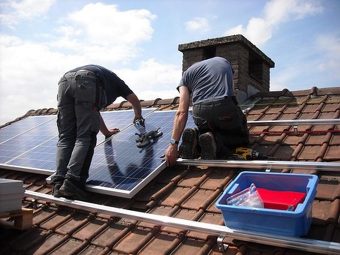
If you’re building a new house or putting on a new roof next year, and your place is bigger than 1,100 square feet, then St. Petersburg city officials may require you to install solar panels.
As the place that has long billed itself as “the Sunshine City,” St. Petersburg hopes to boost the number of solar-powered homes as part of a broader commitment made last year to convert the city to renewable energy sources, said Sharon Wright, the city’s sustainability coordinator.
“It’s just taking advantage of the resource that we have,” said Susan Glickman, who runs the Florida chapter of the Southern Alliance for Clean Energy and supports the measure.
Not everyone is eager to make solar power mandatory. Council Chairwoman Darden Rice said Tuesday she’s leaning toward voluntary measures, such as creating incentives, to promote solar.
“If we rush into a mandatory requirement, I don’t want us to suffer a backlash that undoes all the things we’ve already achieved,” said Rice, a former Sierra Club activist who co-founded the Pinellas Living Green Expo. “What we have to do is slow it down a little bit.”
The City Council will kick off a discussion of the proposed ordinance at 6:30 p.m. Wednesday at the Sunshine Center. A tentative schedule calls for considering a final version by December, with the effective date sometime in 2018.
If passed, the ordinance would make St. Petersburg only the second Florida city to mandate solar for new homes, according to the Florida Solar Energy Center at the University of Central Florida. The first city to pass such a requirement was South Miami, although its ordinance won’t take effect until Sept. 14, according to its mayor.
The push for both ordinances came from a University of Miami student named Delaney Reynolds, founder of the Sink or Swim Project, which tries to raise awareness of sea level rise. Reynolds’ climate activism has led her to giving a talk at the United Nations and being featured on an MTV special with former Vice President Al Gore and rapper Fat Joe earlier this year.
Reynolds lives part-time in South Miami and part-time on No Name Key. Earlier this year she persuaded South Miami officials to pass their ordinance, modeled on one from California.
The South Miami ordinance was opposed by utility officials and some homeowners concerned about the cost, according to South Miami Mayor Philip Stoddard. But when it came up for a vote, the council approved it 4-1, he said.
Now Reynolds is trying to spread the idea around, presenting it not just in St. Petersburg but also Orlando and Sarasota, she said. She’s pleased with her success in St. Petersburg.
“My hope was to stimulate thought by the city leaders, but I was pleasantly surprised when they decided to take a vote following my presentation to begin researching and drafting a law like the one I’ve advocated for South Miami,” Reynolds said in an email to the Tampa Bay Times. “Candidly, the response was fantastic and exactly what we need to happen all over Florida and our country.”
Rice called the student’s presentation “very bold, very visionary,” and said it got the conversation started among city officials. She said the timing of the workshop, falling the day after a hard-fought municipal primary, “didn’t have anything to do with the election.”
Neither she nor Wright could explain why the St. Petersburg draft ordinance differs from the South Miami ordinance in one crucial respect. The St. Petersburg draft would require solar panels on not just new homes, but also on additions to homes and even includes it as part of “major roof repairs.” The South Miami ordinance covers only new construction.
“I haven’t dug into that,” Rice said.
Solar energy had grown in popularity in St. Petersburg in recent years, Glickman said, noting that in 2014 Great Bay Distributors announced it would top its building with Florida’s largest private solar array.
The League of Women Voters formed a solar cooperative that offers free membership in exchange for a discounted rate for solar installation, Glickman said. So far 55 people have signed up for the co-op, Wright said.
“The co-op would help bring the price down,” Rice said. Still, she predicted the ordinance will face opposition from real estate, construction and other business interests.
The city also added solar panels to the new police headquarters at a cost of $2.3 million.
Source: tampabay.com

